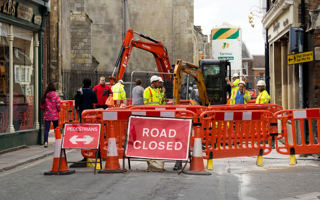A new digital service to provide motorists with accurate data on street works called Street Manager will launch next year.
The Department for Transport (DfT) is investing up to £10 million in the project, which will generate real-time data and will be free for technology companies and app developers to use.
This, says the DfT, will allow existing apps and providers, such as Waze and Google maps, to enhance their services making them even more accurate and allow other firms to create new products to help drivers avoid jams.
It could see the latest data being shared via satnavs and app ‘push’ notifications to help motorists choose a new route.
Roads Minister Jesse Norman said: “Roadworks can often be frustrating for motorists, especially when they cause hold-ups at busy times and delay journeys.
“We want to reduce this disruption and delay, and Street Manager is just one of a number of actions we are taking so that local authorities and utility companies can better plan and manage their roadworks.”
Street Manager will replace an out-of-date and ineffective system currently in use by local authorities and utility companies, allowing them to accurately record and share data better on the 2.5 million roadworks that take place in England each year, says the DfT.
It will support them to collaborate on joint works and better coordinate timings so that drivers don’t get caught up in multiple works.
It will also support local businesses across the country by helping stop delivery vehicles from getting stuck in traffic jams caused by roadworks, it says.
Alongside this, the Government is publishing new bidding guidance on lane rental schemes, which enable councils across England to charge utility companies up to £2,500 a day for carrying out roadworks on the busiest roads at peak times.
The guidance informs local authorities as to how they can develop a lane rental scheme, and includes a new calculator for assessing the costs and benefits of schemes.
It will also help utility companies to work with local authorities to avoid charges by co-ordinating works, or working at quieter times - benefitting all road users, especially those travelling at peak times.
Pilot lane rental schemes in London and Kent saw congestion on the busiest roads drop by half, saving drivers time and boosting the economy.
It also comes after Transport Secretary, Chris Grayling, called on companies to carry out works on pavements, where possible, instead of under roads to avoid disruption to motorists.





















Login to comment
Comments
No comments have been made yet.